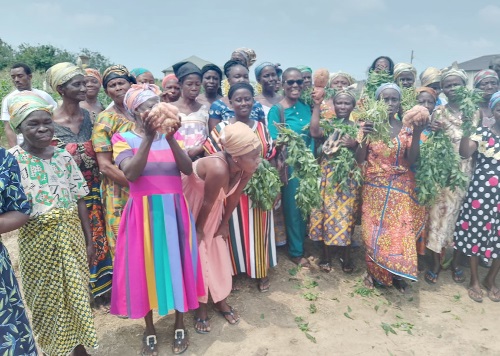
AICCRA project: Central Region farmers attest to benefits received
Aunt Aba Maanan, 60, is a farmer with farms at Akotokyir in Cape Coast. She cultivates sweet potatoes, maize, cassava and vegetables including tomatoes and pepper.
Advertisement
While farming has been her source of livelihood for years and has helped her sustain her family, age and the changing climate have had their toll on her farming and output.
She really needs to optimise the produce of her farm because she has mouths to feed. Compounding her situation, not too long ago, Aunt Maanan's daughter died, leaving her with five young children to feed.
"I need to ensure that whatever they eat impacts their health positively and that is why I have collected some potatoes to plant. These are healthier and with the new practices learnt, I believe it will really help my family,” she stated.
Aunt Maanan is among the more than 1,000 farmers in the Central Region who are receiving training in new farming technologies under the Accelerating Impacts of CGIAR Climate Research for Africa (AICCRA) Ghana project.
They include 121 females specifically targeted in order to help improve cultivation and access to fortified crops for their families.
The Consortium of International Agricultural Research Centres (CGIAR) is a global partnership that unites organisations engaged in research for a food secure future.
Demonstration farms
The AICCRA project has 31 demonstration farms in 22 communities across six regions. These are the Greater Accra, Central, Bono East, Northern, Upper East and Upper West regions.
In the Central Region the project is being undertaken in the Cape Coast Metropolis and the Komenda-Edina-Eguafo-Abrem Municipality with attention on identified improved varieties of maize, cowpeas and sweet potatoes.
The participating farmers were taken through demonstrations on the Mempeasem demonstration farms last week.
Aunt Maanan said though she cultivated sweet potatoes, the Apomuden (health) variety also known as the orange fleshed sweet potatoes (OFSP) was new to her.
The orange fleshed sweet potato, which derives its name from its orange colour is known to have enormous health benefits, including its ability to help gain weight and boost immunity.
It is also known to help ease digestion and treat bronchitis, arthritis and stomach ulcers, prevent dehydration and help control diabetes.
The OFSP is a great source of Vitamin A and hence helps prevent Vitamin A deficiency and is mainly used as baby foods due to its properties as an all-in-one food benefit.
It can be eaten uncooked or boiled.
Boost
Aunt Maanan said she would need to cultivate it to boost the health benefits of her family and to boost her income.
"I grow the white potatoes but I have taken stems (stolons) for planting. It's healthy and with the practices we have been taught I believe the harvests will be good," she said.
Another farmer, Monica Amonoo, said the good agronomic practices learnt under the project had positively impacted her farm yields and urged the participants to adopt them.
Senior Research Officer at the CSIR-CRI working on the project, Dr Stephen Yeboah, explained that women remained critical to the well-being of families and the involvement of the women farmers was essential if the project was to achieve its goals of ensuring food security and health for all.
He observed that in the face of climate change it was important that farmers understood the relevance of their crops to the health and socio-economic welfare of their families and their communities.
"It is necessary that they don't just grow but grow crops with essential food nutrients necessary for healthy growth and development and that is what this project seeks to do," he stated.
Neem technology
The introduction of the "neem technology" where powder from neem leaves is applied to the soil before planting the potatoes to prevent nematodes attacking the potatoes was a plus for the farmers.
Farmers were taught how to apply the neem powder in planting the potatoes and other crops to get the best yields.
Dr Yeboah said maize varieties such as the Opeaburo, Atika Denbea, and Ahofew were all bio-fortified varieties with disease resistant character, to ensure farmers got the most from their farms and fortified food for their families and for sale.
He said it was important that farmers were equipped with local and cheaper solutions to problems for better outcomes in the face of climate change and its impact on farming.
The Central Regional officer of Women in Agriculture Development urged the farmers, especially the women, to be advocates in the communities and to use the knowledge acquired to boost yields.
The Cape Coast Metropolitan Director of Agriculture, Olympia Williams, urged farmers to remain critical in food security, adding that the project was also to improve the nation's food security.



